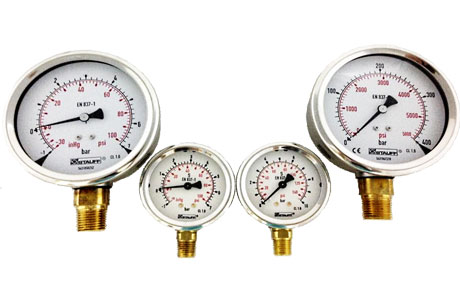What Are The Four 4 Types Of Pressure Gauge?
Key Takeaway
The four main types of pressure gauges are Bourdon tube, diaphragm, bellows, and piezoelectric gauges. Bourdon tube gauges are common and measure pressure through a coiled tube that straightens with pressure. Diaphragm gauges use a flexible membrane to sense pressure changes.
Bellows gauges work using expandable bellows to measure pressure, while piezoelectric gauges rely on electrical signals generated by pressure-induced crystal deformation. Each type serves specific industrial or scientific needs.
Overview of Pressure Gauges
Pressure gauges play a vital role in various industries, helping measure and regulate pressure levels in systems. Whether you’re working in manufacturing, automotive, or energy, understanding the types of pressure gauges is essential for ensuring safety and efficiency. For new engineers stepping into the field, recognizing the key types will empower you to make informed decisions.
There are four main types of pressure gauges: Bourdon Tube, Diaphragm, Capsule, and Digital. Each type has specific applications and benefits, making them suitable for different industrial needs. Let’s dive deeper into these gauges and their features.

Key Features of the 4 Types of Pressure Gauges
1. Bourdon Tube Pressure Gauge: This is the most commonly used pressure gauge in industries. It operates on the principle of a coiled tube that straightens when exposed to pressure. Bourdon tube gauges are ideal for measuring medium to high pressures, ranging from 0.6 bar to 7000 bar.Key features include durability, simple operation, and affordability. They’re typically used in pipelines, gas cylinders, and HVAC systems. However, they’re not suitable for measuring extremely low pressures or highly fluctuating pressures.
2. Diaphragm Pressure Gauge :Diaphragm gauges utilize a thin, flexible membrane that deflects under pressure. These gauges are perfect for low-pressure measurements and are widely used in chemical and food industries due to their ability to handle corrosive and viscous media.Key advantages include accuracy, resistance to overpressure, and adaptability to sanitary applications. However, they’re less durable compared to Bourdon tube gauges.
3. Capsule Pressure Gauge :Capsule gauges are designed for measuring very low pressures. They consist of two flexible capsules sealed together. These gauges are often used in laboratories, cleanrooms, and low-pressure applications.Key strengths are their high sensitivity and precision for low-pressure environments. However, they’re not suitable for high-pressure or industrial-scale applications.
4. Digital Pressure Gauge “Digital gauges are modern instruments equipped with electronic sensors and digital displays. They’re versatile, offering features like data logging, alarms, and remote monitoring. Key benefits include high accuracy, ease of use, and the ability to measure dynamic pressures. Their drawbacks include dependency on power sources and higher costs compared to mechanical gauges.
Applications of Different Pressure Gauge Types
Bourdon Tube Applications-These gauges are ideal for industrial machinery, automotive systems, and hydraulic applications. For example, monitoring gas cylinders in welding shops or ensuring proper pressure in HVAC systems.
Diaphragm Applications-Used in industries like pharmaceuticals, where maintaining sterile and accurate pressure levels is crucial. They’re also common in chemical plants handling corrosive fluids.
Capsule Applications-Capsule gauges are widely employed in weather monitoring systems, air pressure testing, and medical devices such as ventilators. Their ability to measure minute pressure differences is unmatched.
Digital Applications-Digital gauges find applications in modern industries such as oil and gas, where precision and data tracking are essential. They’re also used in R&D labs for conducting detailed pressure analysis.
Advantages of Using Various Types
Each type of pressure gauge offers unique advantages tailored to specific needs. Bourdon tube gauges are cost-effective and reliable for high-pressure applications. Diaphragm gauges excel in handling corrosive and viscous media, making them perfect for food and chemical industries.
Capsule gauges stand out for low-pressure measurements, delivering unmatched precision in sensitive environments like labs and weather stations. Digital gauges offer unparalleled accuracy, remote access, and advanced functionalities, making them ideal for tech-driven applications.
Understanding these advantages allows engineers to choose the best gauge for their requirements, ensuring optimal performance and safety.
How to Choose the Right Type for Your Needs
Selecting the right pressure gauge depends on factors such as pressure range, media compatibility, and environmental conditions. Here are some guidelines:
Determine the Pressure RangeChoose Bourdon tube gauges for high pressures or capsule gauges for low pressures. Match the range with your application’s requirements.
Media CompatibilityConsider the type of media. Diaphragm gauges are best for corrosive or viscous substances, while Bourdon gauges work well with gases and liquids.
Environmental ConditionsIf the gauge is exposed to extreme conditions, opt for durable options like Bourdon tube or digital gauges.
Application RequirementsFor precise monitoring and data analysis, digital gauges are the go-to choice. For cost-sensitive applications, stick with mechanical gauges.
By assessing these factors, you can ensure long-lasting and efficient performance of the pressure gauge in your system.
Conclusion
Understanding the four types of pressure gauges—Bourdon Tube, Diaphragm, Capsule, and Digital—is fundamental for new engineers in the industry. Each gauge offers unique features and benefits, tailored to specific applications. By selecting the right type based on your needs, you’ll enhance system efficiency, safety, and reliability.
Pressure gauges are indispensable tools in industrial operations. Embrace the knowledge shared here to make informed choices and contribute effectively to your field.

